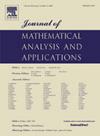Integral operators in the Schatten class on Dirichlet spaces
IF 1.2
3区 数学
Q1 MATHEMATICS
Journal of Mathematical Analysis and Applications
Pub Date : 2025-09-08
DOI:10.1016/j.jmaa.2025.130060
引用次数: 0
Abstract
We characterize three integral operators in Schatten p-classes on Dirichlet spaces in the unit disk for and . The main results are threefold:
- (1)If and g is a holomorphic function in , then the Volterra operator , defined by is in the Schatten p-class on if and only if
- (2)If and , μ is a finite Borel measure on , then the Toeplitz operator acting on is in the Schatten p-class if and only if where t is any (or some) nonnegative number such that .
- (3)If g is a holomorphic function in , and , then the small Hankel operator acting from to the Sobolev space is in the Schatten p-class if and only if g belongs to the Besov space .
狄利克雷空间上Schatten类的积分算子
在单位圆盘D上的Dirichlet空间Dα上刻画了Schatten p-类中α>;0和0<;p<;∞上的三个积分算子。主要结果有三个:(1)如果0<;α<1<p<;∞且g在D上是全纯函数,则由tgf (z)=∫0zf(ζ)g ' (ζ)dζ定义的Volterra算子Tg在Dα上属于Schatten p-类,当且仅当∫D((1 - |w|2)α∫D|g ' (z)|2dAα(z)|1 - w¯z|2+2α)p2(1 - |w|2)p - 2dA(w)<∞。(2)如果α>;0和0<;p<∞,μ是D上的有限Borel测度,则作用于Dα上的Toeplitz算子Qμα是Schatten p类的当且仅当∫D((1−|w|2)α+2t∫Ddμ(z)|1−w¯z|2α+2t)p(1−|w|2)−2dA(w)<∞,其中t是任意(或某些)非负数,使得α+2t>;max ({1,1p})。(3)如果g是D中α>;0和0<;p≤1中的全纯函数,则当且仅当g属于Besov空间Bp时,从Dα作用到Sobolev空间Lα2的小Hankel算子hgα在Schatten p类中。这些结果回答了Pau-Peláez [12] (J. Anal)留下的相应开放问题。数学。120(2013),255-289。
本文章由计算机程序翻译,如有差异,请以英文原文为准。
求助全文
约1分钟内获得全文
求助全文
来源期刊
CiteScore
2.50
自引率
7.70%
发文量
790
审稿时长
6 months
期刊介绍:
The Journal of Mathematical Analysis and Applications presents papers that treat mathematical analysis and its numerous applications. The journal emphasizes articles devoted to the mathematical treatment of questions arising in physics, chemistry, biology, and engineering, particularly those that stress analytical aspects and novel problems and their solutions.
Papers are sought which employ one or more of the following areas of classical analysis:
• Analytic number theory
• Functional analysis and operator theory
• Real and harmonic analysis
• Complex analysis
• Numerical analysis
• Applied mathematics
• Partial differential equations
• Dynamical systems
• Control and Optimization
• Probability
• Mathematical biology
• Combinatorics
• Mathematical physics.

 求助内容:
求助内容: 应助结果提醒方式:
应助结果提醒方式:


